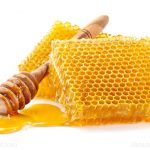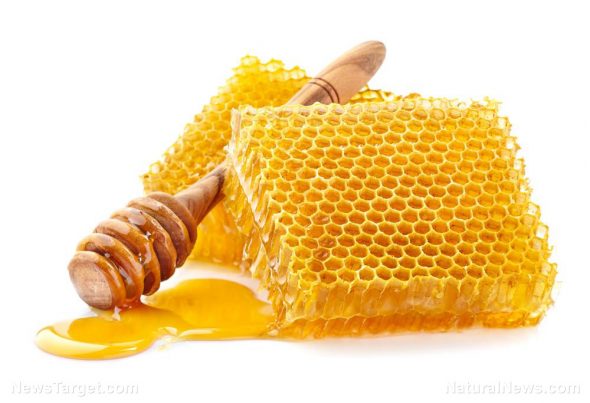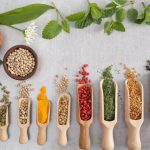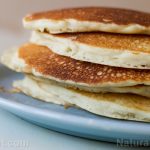
Sweet, sweet relief: Try this recipe for a natural honey spread that can help relieve seasonal allergy symptoms
Monday, September 30, 2019 by Grace Olson
http://www.naturalnewsrecipes.com/2019-09-30-natural-honey-spread-to-relieve-seasonal-allergy.html

Along with the changing of the seasons comes a new round of clogged noses and itchy throats. But do not worry. From Dawn Comb’s book, Sweet Recipes, the simple mixture below will help relieve some of the symptoms of seasonal allergies. Best of all, it comes with one of nature’s sweetest delicacies: honey.
Honey’s health benefits
Everyone knows what honey is. The thick, yellowish liquid has been popular even before it graced the screens as Winnie the Pooh’s favorite meal. It is a natural sweetener and a healthier option than its counterparts, such as sugar. While the common table sugar is 100 percent empty calories, honey contains 64 calories and 17 g of sugar, like fructose, glucose, maltose, and sucrose. (Related: Honey and its many benefits to overall health and wellness.)
Here are just some of the health benefits of consuming raw, organic honey:
- High-quality honey is rich in antioxidants. Antioxidants are compounds that fight free radicals. They prevent the development of chronic diseases such as cancer and Alzheimer’s disease.
- For people who have diabetes, honey can replace sugar in their diets although they should still consume it with caution. Honey can still increase blood sugar levels, though not as drastically as sugar.
- Honey decreases LDL (low-density lipoprotein) cholesterol in the body. LDL or “bad” cholesterol contributes to fat buildup in the arteries. At the same time, honey increases HDL (high-density lipoprotein) or “good” cholesterol, which helps remove other forms of cholesterol from the blood.
- Besides providing antioxidants and managing blood cholesterol levels, honey also benefits cardiovascular health in other ways. Honey helps lower blood pressure, decrease triglyceride levels, and prevent heart attack and stroke.
Honey against seasonal allergies
Allergies occur when the body reacts to a foreign substance that does not cause a reaction in most people. In seasonal allergies, there is usually an influx of pollen in the air due to the abundant cross-pollination of plants. The timing and severity of allergies vary across different areas and states.
Your immune system produces antibodies in contact with the allergen, and this causes inflammation. The common symptoms are sneezing, itchy nose or eyes, runny or stuffy nose, and watery eyes.
Honey has been proven to alleviate coughing among children. This soothing ability has been linked to relieving the symptoms of seasonal allergies.
The recipe below capitalizes on that link. Combined with a powdered herb formula and raw pollen, it becomes a powerful aid for those who suffer from seasonal allergies.
Recipe for honey spread
Ingredients:
Powdered herb formula
- 1 part dandelion root powder
- 1 part eleuthero powder
- 1 part nettle powder
- 1 part orange peel powder
- 1 part wild yam root powder
Honey spread
- 5 teaspoons powdered herb formula
- 1/4 teaspoon raw pollen
- 1 cup raw honey
Method:
- Combine the powdered herb formula and raw pollen with the cup of raw honey.
- Place the mixture in a closed container to keep insects away.
- Keep the container in a cool, dry area.
- Take 1-3 spoons of your honey spread daily.
The powdered herb formula gives an additional boost to your immune system. Nettle (Urtica dioica) contains antihistamine properties. A histamine response is a result of contact with an allergen, causing coughing, respiratory distress, and other symptoms. Dandelion root (Taraxacum officinale) and wild yam root (Dioscoera villosa) help decongest the liver. It will remove the foreign substances out of the bloodstream and impede the histamine response. Everything is rounded out by the eleuthero (Eleutherococcus senticosus) or Siberian ginseng, which is an herb that helps the body respond to stress.
Warning: Unfortunately, since honey is so popular, some producers commit “honey adulteration.” It is the practice of mixing honey with plain syrup, lowering its purity. While honey adulteration is illegal in most countries, it is still widely practiced. To avoid consuming adulterated honey, make it a point to know the source before buying honey or better yet, choose locally produced honey.
Sources include:
Tagged Under: Tags: allergy, alternative medicine, Alzheimer's disease, antihistamine, antioxidants, blood pressure, blood sugar, calories, cardiovascular health, clean food, dawn comb, diabetes, food cures, food is medicine, fructose, functional food, glucose, HDL cholesterol, heart attack, herb formula, honey, honey spread, immune system, inflammation, LDL cholesterol, natural cures, natural ingredients, natural medicine, natural sweetener, pollen, pollination, recipes, remedies, runny nose, seasonal allergies, sneezing, stroke, stuffy nose, sugar, superfoods, triglycerides





